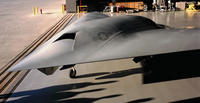-
Milestone: Trusted Traveler reaches million members
U.S. Customs and Border Protection (CBP) said the agency’s Trusted Traveler Programs have reached one million members; Trusted Traveler Programs include Global Entry, NEXUS, SENTRI, and FAST
-
-
A "whole-system redesign" of U.S. agriculture
Transformative changes in markets, policy, and science, rather than just incremental changes in farming practices and technology, will be critical if the United States is to achieve long-term sustainability in agriculture, according to a nationwide team of agriculturists that includes a University of California, Davis, animal scientist
-
-
Goodyear changes blimps to Zeppelins

There are few things more familiar to Americans than the Goodyear Blimp; no major sporting event would be complete without one of these blimps hovering overhead; during its long operational history, Goodyear has built and operated more than 300 airships; currently, the company has a fleet of three blimps, based in Ohio, Florida, and California; these blimps are reaching the end of their operational life, and Goodyear has signed an agreement with German company ZLT Zeppelin Luftschifftechnik to supply Goodyear with airships well into the next decade; the new Goodyear-Zeppelin airships will be slightly larger than the airships in Goodyear’s current fleet, fly faster, carry more passengers, and include state-of-the art avionics and flight control systems
-
-
APDN helps prevent government use of fake microchips
Applied DNA Sciences Inc. (APDN) recently announced that it is working with the U.S. government to prevent the use of counterfeit microchips in mission-critical hardware that can lead to potential life-threatening equipment failures; the company is launching a pilot program in conjunction with the government that is designed to ensure that phony microchips do not enter critical supply chains; with the growth of outsourcing and global production chains, pirated microchips have begun appearing in everything from cell phones to fighter jets; the New York based firm specializes in the development of plant based DNA markers that can be safely inserted into any material to ensure its authenticity
-
-
Phantom Ray completes maiden flight

Phantom Ray, Boeing’s fighter-sized unmanned airborne system (UAS), took to the early morning skies on 27 April at Edwards Air Force Base in California for its maiden flight; Phantom Ray is one of several programs in Boeing’s Phantom Works division, including Phantom Eye, which is part of a rapid prototyping initiative to design, develop, and build advanced aircraft and then demonstrate their capabilities
-
-
25 million more users hit in second cyber attack on Sony

Japanese electronics giant Sony recently announced that hackers successfully broke into its networks and stole sensitive data from more than twenty-five million online gaming subscribers; the announcement comes days after Sony’s admission that seventy-seven million users had their personal information stolen; in the most recent attack, hackers infiltrated Sony’s Online Entertainment network and stole names, addresses, emails, birth dates, and even phone numbers from online gamers; some analysts estimate that the attacks could cost Sony and credit card companies as much as $1 to $2 billion
-
-
Hackers crack Nikon's image verification system
A cyber security firm recently announced that it had successfully hacked Nikon’s image verification system that protects digital photos; ElcomSoft, a cyber security firm, says that its hackers have successfully replicated the electronic signature code from Nikon images allowing it to manipulate photos that still pass authentication tests; Nikon’s Image Authentication System is aimed at verifying digital images to ensure that they have not been tampered with especially when used in forensics, accident reports, or construction documentation; ElcomSoft says that its goal was to raise awareness about the security vulnerability and the company has alerted Nikon to the weaknesses of its system
-
-
Dynasil wins DHS award for radiation detection
Dynasil Corporation’s research division, Radiation Monitoring Devices, Inc. (RMD), was recently named DHS’ small business winner for radiation and nuclear detection for 2011; the award is meant to honor small businesses that are excelling in innovative achievement and demonstrate a commitment to national security; RMD was recognized particularly for its development of two new radiation detection materials, strontium iodide and CLYC crystals; DHS is especially keen to develop these new radiation detection materials as the current industry standard, helium-3, is suffering from major shortages
-
-
Deleted text messages hamper police
The number of text messages grows exponentially; this year, people around the world will exchange five trillion messages; phone companies either no longer keep back up copies of text messages, or keep them for a very short period of time; police is worried that this policy will hobble future investigations
-
-
Intrusion detection company joins chemical society
The growing attention to chemical plants safety leads perimeter security companies to show even more interest in that sector; Senstar, a manufacturer of perimeter intrusion detection technology, joins the Society of Chemical Manufacturers and Affiliates
-
-
Sony's gaming network hacked, Microsoft's follows suit

Gamers are in a frenzy over Sony’s announcement that its PlayStation network security had been breached, resulting in the exposure of a large amount of each user’s personal and financial information; the first of an expected flood of lawsuits, as well as class action is filed in U.S. District Court; Microsoft announces an exploited vulnerability in one of their game titles leading to phishing attempts, and acknowledged that previously banned “modded” consoles were attaching to the network again
-
-
Critical safety and security flaws in airplane maintenance outsourcing
A recent study found that airlines outsourcing their maintenance work could prove to be a major security gap and result in unreliable planes; the Transport Workers Union found that when major U.S. airlines outsource their work they have little training, oversight, or safety measures in place to ensure that the workers they hire perform quality work and do not pose a security threat; at least one member of al-Qaeda has been found working in a major maintenance facility in Singapore in 2003; the lack of training and certification could also result in shoddy airplane repair work; there are only 100 FAA inspectors for over 700 overseas maintenance facilities
-
-
Virtual Imaging: versatile detection at low radiation dosage
Virtual Imaging, a Canon U.S.A. Company, is offering its RadPRO SecurPASS, a full body security screening system that detects and recognizes a range of objects and materials in about eight seconds per person; it uses transmission imaging with an exceptionally low dose of X-rays to scan for dangerous or illegal substances such as liquid explosives, drugs, copper wires, plastic, etc.; its applications range from civil security, that is, airports, seaports, railways, bus stations, to border security, prison security, and high level security as necessitated by nuclear power plants, military premises, and embassies
-
-
Ceelox unveils fingerprint authentication for cloud networks
Ceelox, Inc. recently announced the release of Ceelox ID Online which is a biometric solution designed specifically for cloud computing applications; users can now use their fingerprints to securely authenticate their credentials, minimizing the threat of having their user name and password stolen or compromised; stolen passwords and online identity theft has risen dramatically in recent years; from mid-2005 to mid-2006 alone, roughly fifteen million Americans were the victims of fraud related to identity theft; with Ceelox ID, users also have the flexibility to use one password for all their accounts to increase flexibility and convenience, while maintaining security
-
-
Precise Biometrics makes it easier for firms to build hardware
The longest delays in the production of biometrics hardware has been the integration of fingerprint recognition software, but thanks to a recently released product by Precise Biometrics, hardware manufacturers will find it even easier to build their devices; Precise Biometrics announced the launch of BioMatch Embedded, a software product that enables hardware companies to quickly and easily integrate fingerprint verification into their products; the firm says that rapid design, development, and testing is a key factor in how competitive a hardware manufacturer, and Precise Biometrics’ believes that BioMatch Embedded will help speed up this process
-
More headlines
The long view
Factories First: Winning the Drone War Before It Starts
Wars are won by factories before they are won on the battlefield,Martin C. Feldmann writes, noting that the United States lacks the manufacturing depth for the coming drone age. Rectifying this situation “will take far more than procurement tweaks,” Feldmann writes. “It demands a national-level, wartime-scale industrial mobilization.”
Trump Is Fast-Tracking New Coal Mines — Even When They Don’t Make Economic Sense
In Appalachian Tennessee, mines shut down and couldn’t pay their debts. Now a new one is opening under the guise of an “energy emergency.”
Smaller Nuclear Reactors Spark Renewed Interest in a Once-Shunned Energy Source
In the past two years, half the states have taken action to promote nuclear power, from creating nuclear task forces to integrating nuclear into long-term energy plans.
